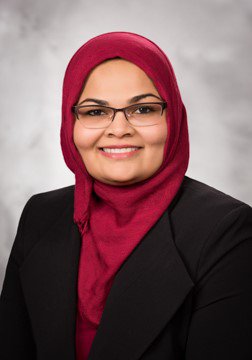
Please join us in welcoming Nada Patel, MD, to IHA Internal Medicine – Cherry Hill. Dr. Patel has clinical interests in preventive medicine and management of chronic conditions.

Please join us in welcoming Nada Patel, MD, to IHA Internal Medicine – Cherry Hill. Dr. Patel has clinical interests in preventive medicine and management of chronic conditions.
Below is a listing of IHA’s pediatric and family medicine offices that are now scheduling annual check-ups. Beat the summer rush – don’t wait until the last minute to schedule your child’s check-up. Appointments are now available. Click the link below to make an appointment online, or call the office directly. If you schedule online, please select “physical” from the appointment type drop down menu.
Also, as a reminder, if your child is planning on participating in sports during the 2016 – 2017 school year, the Michigan High School Athletic Association (MHSAA) requires that they receive a sports physical after April 15, 2016.
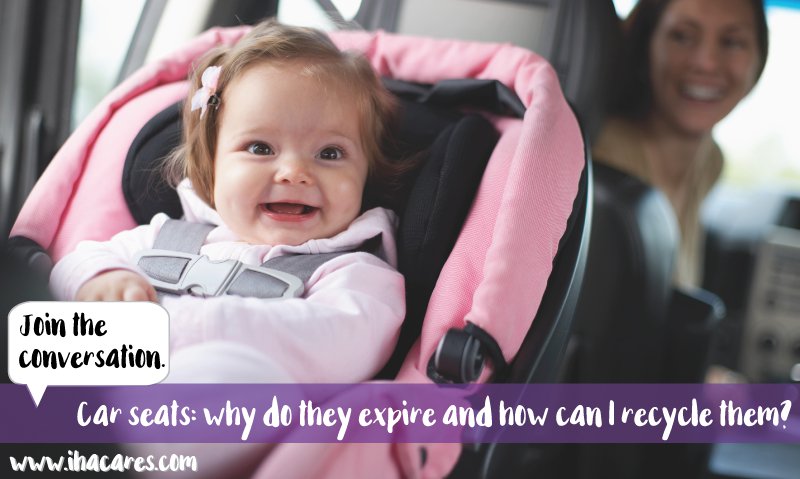
As all parents and caretakers know, a car seat is mandatory for young children and infants. But what do you do when your child has outgrown their seat, or it’s expired or been in an accident? There are approximately 12 million car seats purchased in the US every year, many of those ending up in landfills once they’ve been retired.
90% of the materials, by weight, can be recycled. There are two locations in Ann Arbor that accept retired car seats for recycling, which are listed below.
Why does a car seat expire or become unusable after a car accident? They expire because the plastic materials they’re made of degrades over time from ultraviolet light, which weakens the effectiveness of the frame to withstand impact in a crash.
They’re unusable after an accident, even if they look fine, for similar reasons. Think of the car seat like an airbag- it’s there to save your child’s life. You have to replace your airbag after a crash because it can no longer withstand impact and help save your life- it’s only useful for one crash. A car seat is the same. It may look like it hasn’t sustained any damage, but there could be cracks or fractures in the plastic that puts your baby’s life at risk in the event of another crash.
To properly dispose of a car seat, you should strip the entire seat of the cover, the straps, disassemble everything and cut the straps. It’s also recommended you write all over the plastic base something like “EXPIRED” or “CRASHED” in permanent marker, to stop someone from trying to use it. There are two locations in Ann Arbor that accept car seats for recycling: Drop-off station on East Ellsworth, and the recovery yard on Jackson Road. For more information visit Recycle Ann Arbor.
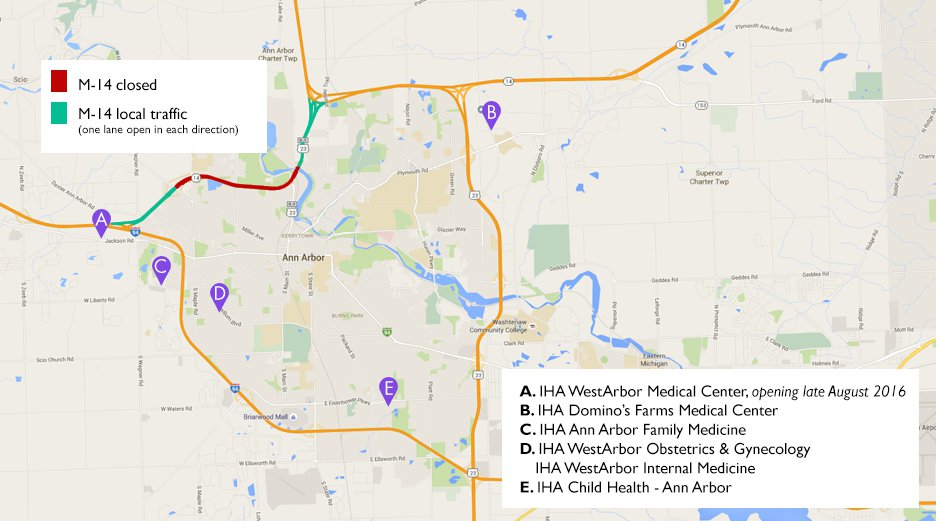
Beginning Friday, March 4 at 9:00 pm, M-14 between Miller Road and Main Street will be shut down for construction. This closure is expected to last through summer and into the fall, which may impact your normal route to one of our office locations. Please allow yourself extra time to make it to your scheduled appointments.
In addition, if you are a patient at IHA Ann Arbor Family Medicine, IHA WestArbor Obstetrics & Gynecology, IHA WestArbor Internal Medicine or IHA Child Health – Ann Arbor, we are also aware that the construction may delay your drive time to your office when our new building, IHA WestArbor Medical Center, opens in late August.
Mdot’s interactive map will give you a closer look and other information about the project. Check it out here.
All IHA providers, in particular our OBGYN providers, are up to date on the latest CDC protocols surrounding Zika.
Further reading:
Travelling to a country with Zika
Pregnant women and Zika
Transmission of Zika
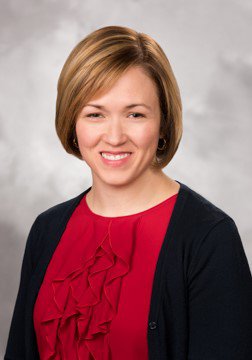
Please join us in welcoming Julie Byrne, CFNP, to IHA Livingston Pediatrics. Julie has clinical interests in newborns, breastfeeding, wellness promotion and healthy lifestyles for the whole family.
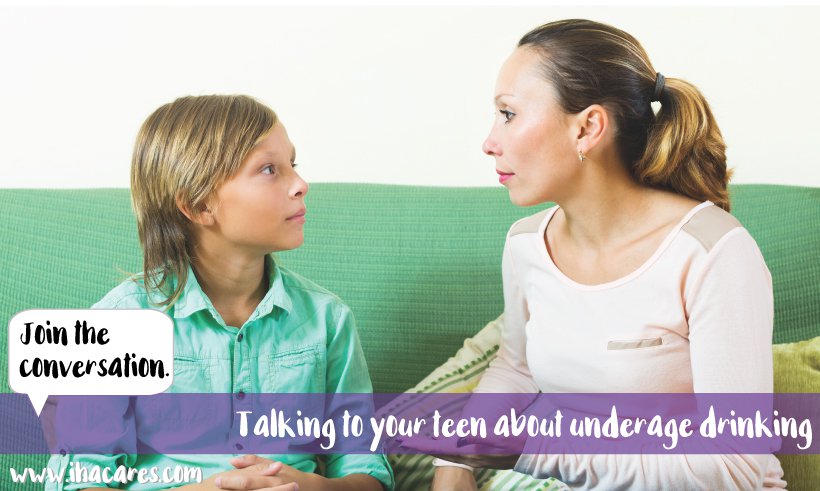
By the time they reach 8th grade, nearly 50% of all adolescents have had at least one alcoholic drink with over 20% report having been drunk. In addition to being illegal, underage drinking poses high risks. While your child is young, there are significant changes in the body, including rapid hormonal changes and the formation of new networks in the brain. Young adults are extremely vulnerable to alcohol-related brain damage. The immediate and long-term risks associated with underage drinking continue to show the need for prevention and treatment programs.
The 2013 Youth Risk Behavior Survey (link) of more than 13,000 high school students nationwide found that in the past 30 days:
As a parent, you should feel comfortable talking to your children about underage drinking, the risks and the consequences. Often, teens do not consider consequences when making choices like to drink underage, because they do not believe they could get in an accident, or drink so much they pass out. However, alcohol related crashes are greater for drivers aged 16-20 than drivers 21 and older.
Peer pressure plays a huge role in underage drinking, as well as how alcohol is portrayed in the media. Your relationship with your children, how you discipline them, how you communicate with them and your involvement in their life are all huge influences in their choice to drink underage – or not. Communicate with your children, be involved in their lives. Encourage their growing independence, but set appropriate limits. Make it easy for them to share information about their lives, and share information about yours. Perhaps you engaged in risky behavior as a teen that you would like to make sure they do not repeat. You could be open about your teenage years and experiences. But do not glamourize any underage drinking you may have done, and be sure to tell them about the great experiences you had without drinking.
Help your children practice ways to say no to their friends: “No thank you, I’m fine,” or “I’d rather be sober,” are great places to start. Set clear rules about alcohol use and enforce the rules you set.
You need to be a positive role model for your children as well. If you drink, drink responsibly. That means not too much or too often. Do not drive when you have been drinking. Get help if you think you have a problem. And do not give alcohol to your children.
If you have any questions about how to start the conversation with your children, ask their pediatrician. They may have suggestions or resources that will help you along the way.
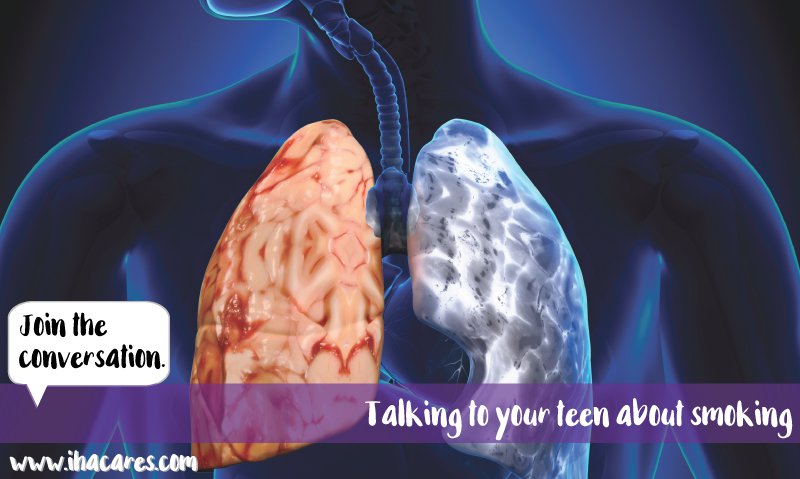
Did you know that every day nearly 3,800 people younger than 18 smoke their first cigarette? According to the Department of Health and Human Services 2,100 youth who are occasional smokers become daily smokers every single day.
The harmful effects of nicotine in teenagers and young adults creates an important call to action for parents. Don’t wait to start the conversation about the hazards of smoking. If you yourself are a smoker, seek help to quit. 5.6 million children alive today (or 1 in every 13 children) will die early from smoking if we do not do more to reduce current smoking rates.
It may be a tough topic to talk about but it’s an important topic. Teens may be more concerned with the immediate impact smoking has on their lives than they are with their health in the future. Emphasize the immediate negative impacts. Remind them that:
On the positive end, there are healthier ways to shine within a peer group, by saying no or through unique interests or hobbies. Also remind them about the long-term effects:
Remind your child that smoking includes e-cigarettes and hookahs. Both have some of the same dangerous effects as cigarettes. Starting the discussion about smoking when your children are young and continuing it through their high school years is important. You, as the parent, are a role model and the greatest influence on your children’s lives. Set a positive example by quitting smoking if you currently smoke.
They will need consistent reinforcement, support and guidance. Knowing if your children’s friends smoke is important. You may be able to help them practice ways to say no. For example “No thanks – I’m good” or “Gross! Those things stink!”
Help your children understand that TV shows and movies may make smoking look “cool” when in reality it’s very harmful. Remind them it’s much harder to quit smoking than it is to start in the first place. Tell them stories about family members with health problems related to smoking, make it real.
Talking about smoking with your children may seem challenging, but it’s important. If you have questions, ask your child’s doctor for information that may help kick-start or continue the conversation.
Due to unforeseen circumstances, IHA After Hours Care – Brighton will be CLOSED Friday, January 22 and Saturday, January 23. We apologize for any inconvenience. We welcome you to visit IHA Urgent Care – Livingston or IHA Urgent Care – Domino’s Farms if you need to see us this weekend.
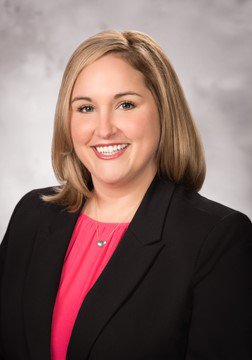
Please join us in welcoming Amanda M. McClure, MD, to IHA Colon & Rectal Surgery. Dr. McClure has clinical interests in the prevention, diagnosis and treatment of colorectal cancer. Dr. McClure specializes in treating diverticulitis, inflammatory bowel disease and anorectal disorders including hemorrhoids, fissures, abscesses and fistulas.She performs specialized testing and treatment for pelvic floor disorders, including constipation and fecal incontinence.